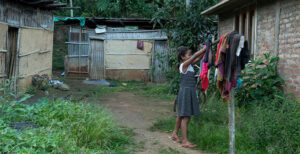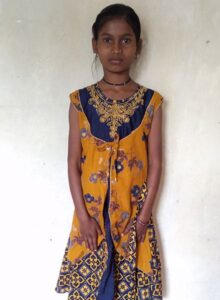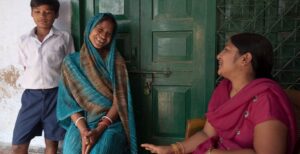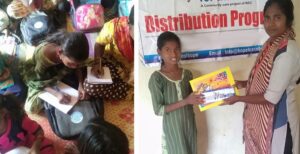Raise funds for Unsponsored Children
There are many ways you can fundraise, whether it’s a bake sale, a marathon, or a party!
This website will offer limited functionality in this browser. We only support the recent versions of major browsers like Chrome, Firefox, Safari, and Edge.

Many girls like Ragna and like the girl pictured must help their mothers with household chores and take care of their siblings. As a result, some don’t get to attend school.
According to UNICEF, millions of girls worldwide are excluded from school.
Girls who do not attend school are more likely to marry young and may have children before age 18.
Selyne knew the child sponsorship program could change the lives of so many girls. The child sponsorship program was dedicated to educating children, especially underprivileged children, and providing them with the means to have a choice for what their future held.
Eleven-year-old Ragna was one such girl lacking education. As the eldest child of her family, most of the household responsibilities fell on her, especially whenever her mother, Roseda, became pregnant again. Ragna often collected wood and water for cooking and for the family’s other daily needs. She cleaned as well and took care of her siblings, increasingly helping her mother with more and more chores.

For Ragna (pictured), GFA World’s Child Sponsorship Program changed her life and opened doors for a brighter future.
School was not a part of Ragna’s life. She had so much to do, and she likely felt that she didn’t have enough time to do everything as it was. Perhaps she imagined a different future for herself, but how could her life possibly change?
Ragna’s father, Deryck, worked as a daily wage laborer, bringing in a meager income, which resulted in his family struggling to meet daily basic needs. Despite this, Deryck understood how important education would be for his children, and he wanted them to have that opportunity, but he lacked the necessary funds and resources to make that happen. Ragna’s mother heavily depended on her and needed her help at home. For Ragna, this was life.
One day, Selyne visited Ragna’s home and spoke with Deryck and Roseda. Perhaps the girl listened in on the conversation, curious to hear what the stranger had to say.
Selyne told Ragna’s parents the benefits of GFA’s child sponsorship program. Their daughter would be given the chance to pursue her own dreams. With a solid education, she’d qualify for higher paying jobs and could even move on to a higher level of education if she so desired. So many opportunities would be open to her. No longer would she be beholden to the way life is just because that’s the way it is. She would have a choice—an opportunity. Though Selyne explained all of this, Ragna’s mother struggled to comprehend its importance.
“The three-kilometers walk to the school will mean traveling [alone] for Ragna, and the time spent at school will mean a huge loss of help at home for me,” Roseda pointed out. “I do know that some girls are going to school in our community, but what’s the point? Girls have to eventually end up at home after marriage. Look at my situation. Why waste Ragna’s time at school? And who else will help me? Are you going to provide for our needs?”
“I was always told that going to school didn’t matter, especially for girls…”
However, this was the chance Ragna’s father had been waiting for. He knew that if his daughter had an education, it could equip her for a job and ease their economic troubles. It could change her life forever and give her opportunities that his own generation had never had, so he agreed to let her go to school.

Like this child sponsorship worker, Sister Selyne met with parents to discuss the benefits of having their children enrolled in the child sponsorship program.
Finally, Ragna had a chance to gain an education. She would have to adjust to a new schedule and lifestyle, but Ragna was determined. Maybe she recognized she was given a very unique gift, and she likely didn’t want to waste a single moment. She wanted a better future—one she could choose rather than it being chosen for her. No one could take that from her—she wouldn’t let them.
“If girls could walk long distances to cut wood from trees, then why couldn’t they walk to school? It was time to cut down the roots of wrong mindsets,” she said. “I was always told that going to school didn’t matter, especially for girls, as their education would not be of any use to their parents. Now, I know better. [I] will go to school and attend the [sponsorship program]. I want to study further and dream to carve a different future for myself.”
By attending the program, not only would Ragna receive key tutoring assistance and required school supplies the family couldn’t afford, but the program staff would invest in character development and set her on the path to a bright future that was very different from her family’s current situation. Not only that, but Ragna would also have the opportunity to experience Christ’s love through the staff of the program.
Over time, Roseda saw how beneficial the program was for her daughter, who especially loved mathematics and expressed an interest in becoming a teacher. This brought Roseda and Deryck much joy. Eventually they decided to enroll their son, giving him the best possible opportunity for his future.
Although Ragna and her brother were blessed with the chance to gain an education through GFA World’s Child Sponsorship Program, so many children still do not have that opportunity. GFA World seeks to make it easier for children, especially girls, to receive quality education.

Children like Ragna (pictured) who are enrolled in GFA’s Child Sponsorship Program receive much-needed benefits, such as education, school supplies and positive activities, and they rejoice because of the brighter future they now have.
With an education, children have a better chance at a brighter future—one they can choose. They will learn how to read, write and do math—skills that will serve them well in life. They will also have the chance to move on to a higher level of education, opening doors to jobs they would never have been able to access without an education. These jobs can break the cycle of poverty for their families, forever changing their lives.
This is only possible by God’s grace and with the generous support of donors like you. With every child that is sponsored, another future is changed. You can help a child to experience that change.
There are many ways you can fundraise, whether it’s a bake sale, a marathon, or a party!